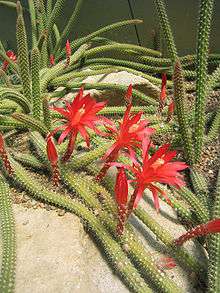Disocactus
| Disocactus | |
|---|---|
 | |
| Disocactus martianus | |
| Scientific classification | |
| Kingdom: | Plantae |
| (unranked): | Angiosperms |
| (unranked): | Eudicots |
| (unranked): | Core eudicots |
| Order: | Caryophyllales |
| Family: | Cactaceae |
| Subfamily: | Cactoideae |
| Tribe: | Hylocereeae |
| Genus: | Disocactus Lindl.[1] |
| Species | |
|
Disocactus ackermannii | |
Disocactus is a genus of epiphytic cacti in the tribe Hylocereeae found in Central America, the Caribbean and northern South America.[1] It should not be confused with Discocactus, which is a different genus.
Species of Disocactus grow in tropical regions either on trees as epiphytes or on rocks as lithophytes. They have two distinct growth habits. Species such as D. phyllanthoides have stems which are round at the base but then become flattened and leaflike. Other species, such as D. flagelliformis have stems which are round throughout their length.[1]
Many of the cultivated plants known as epiphyllum hybrids or just epiphyllums are derived from crosses between species of Disocactus (rather than Epiphyllum) and other genera in the Hylocereeae.[2]
Synonymy
The boundaries of the genera in the tribe Hylocereeae have been subject to considerable change and uncertainty, which is reflected in the number of names which have been used for Disocactus:[1]
- Aporocactus Lem. – of which Aporocereus Fric & Kreuz. is an orthographic variant
- Bonifazia Standl. & Steyerm.
- Chiapasia Britton & Rose
- Heliocereus (A.Berger) Britton & Rose
- Lobeira Alexander
- Nopalxochia Britton & Rose
- Pseudonopalxochia Backeb.
- Wittia K.Schum.
- Wittiocactus Rauschert
Pseudorhipsalis is sometimes included in Disocactus, although kept separate by the International Cactaceae Systematics Group.[1]